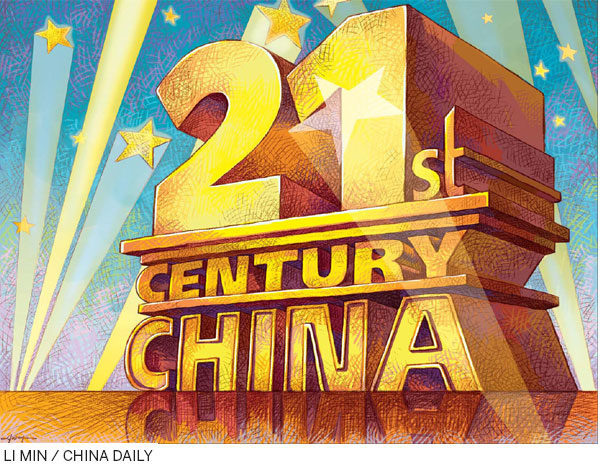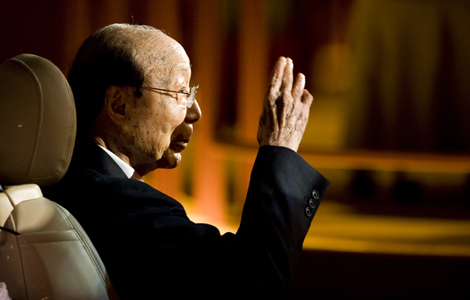Promise, potential, performance
Updated: 2014-01-17 09:27
By Andrew Moody (China Daily Europe)
|
|||||||||||

The latest book on China's position in the world this century offers a nuanced picture of the country's strengths and weaknesses
Will China emerge as the dominant force of the 21st century? The debate on the former Middle Kingdom's global position has been opened up again by leading China commentator Jonathan Fenby.
His new book, Will China Dominate the 21st Century?, which is published in the US this month and worldwide in March, concludes the country's domestic challenges such as reliance on state investment and environmental concerns will divert it from being the leading actor on the world stage.
In this special edition, we not only debate the issues raised by Fenby but present again the views and opinions on China of the leading thinkers, authors and academics who have appeared in the China Daily European Weekly over the past year.
Our Cover Story and Last Word profile subjects have included the foremost China commentators from around the world and today we are giving them another opportunity to stake out their latest positions.
Fenby's latest book deals with perhaps the biggest question of all as to China's future role in the world.
He argues that we are unlikely to move from a world dominated by the United States - as was the case after the collapse of the Soviet Union in 1990 - to one dominated by China.
He believes that by the end of the century, there will be a greater sharing of power with Europe, India, an emergent Russia and new players like Indonesia exerting greater influence.
He makes the case also that China will be held back - at least for the next few decades - by economic issues relating to the weakness of its private sector, underdeveloped banking sector and its inability to innovate as well as management skill gaps.
The book is the latest of a new genre of China's books that presents a more nuanced picture of China's strength. It follows on the heels of US Sinologist David Shambaugh's China Goes Global: The Partial Power and Timothy Beardson's Stumbling Giant: The Threats to China's Future.
This contrasts with perhaps more heady titles that appeared just after the Beijing Olympics, including Martin Jacques's highly acclaimed When China Rules the World: The Rise of the Middle Kingdom and the End of the Western World, which has now sold more than 350,000 copies worldwide.
Rana Mitter, director-designate of Oxford University's new China Centre, believes Fenby reflects a more realistic perspective of China that is now emerging.
"We are now in an era in which people are writing forward projections about China based on the reality that the supercharged economic growth of the last decade is behind us.
"China will continue to grow but at a moderate pace and I think people have adjusted their geopolitical lenses to take account of that fact."
Mitter, who has just made a BBC radio documentary, Shanghai World Redux, about the new confidence of China's commercial capital which will air later this month, says the anniversary of the outbreak of World War I brings home how difficult it is to make long-term forecasts.
"If the 20th century is any guide, then what happened at the beginning was not actually a predictor of what happened at the end," he says.
"I think the trends we have seen over the past 10 or 15 years of China's big population becoming more prosperous, more confident and more international show no signs of reversing and I think this will continue for many decades to come."
Martin Jacques, the British academic and author who made seven visits to China last year, stands behind his view that China will be an increasingly dominant force as the century progresses economically, politically and culturally.
"Of course China has lots of problems and it has been up against many of these since reform and opening up began in the late 1970s. They have, however, been extraordinarily good at overcoming them."
The former deputy editor of The Independent newspaper and editor of Marxism Today, rejects some of the new China realism as being overly pessimistic.
"I think a lot of China writers just have this huge difficulty. If you look at this period since China's rise started, you got this bearish sentiment from Western experts that it was all going to come to an end," he says.
Today's Top News
Xi writes to Chinese in German colleges
China software to rival Android
Will China dominate the world?
Mainland policy lures HK students
Obama tells Germans he will not wiretap
Party is over for SOEs conferences
Egypt referendum wins support
Home prices continue to climb
Hot Topics
Lunar probe , China growth forecasts, Emission rules get tougher, China seen through 'colored lens', International board,
Editor's Picks

|

|

|

|

|

|





